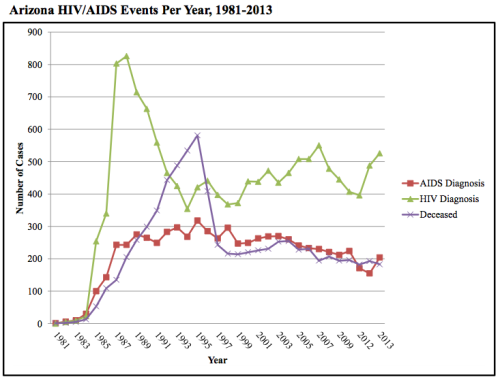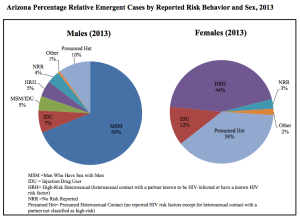
Robert Knight, a professional hairdresser and a peer counselor at the Southern Arizona AIDS Foundation (SAAF), has been living with AIDS for almost 18 years.
His biggest goal right now is to educate the youth so they can be more aware of a disease that is far from being eliminated.
And he has a job to do because health officials say new infection rates continues to climb among Arizona’s youth.
Although the rates of Arizona residents living with HIV/AIDS has grown each year, the number of new infections has been dropping, according to the Arizona Department of Health Services’ 2012 report.
In 2011, 427 new Arizona diagnoses were reported compared to the 539 in 2004.
The numbers of people with HIV and/or AIDS in Pima County has fallen in the past 10 years. But Hispanics account for one out of every four people infected, according to the report.
The reason for a younger generation leading the charts with higher rates of infection today has to with the lack of education and safety, said Knight.
The city of Tucson allows students to opt out of sex education and that might be a problem for the youth. They are unaware of the consequences of risky behavior such as unprotected sex and the sharing of medical needles.
This is why places like SAAF and Tucson Interfaith HIV/AIDS Network (TIHAN) were created. Their goals are to bring awareness to the community and offer counseling to those who are living with HIV or AIDS in Southern Arizona.
However, despite the efforts to educate people about HIV/AIDS, they still are not getting the message.

More than 1.1 million people in the United States are living with HIV and nearly one in five do not know they have it, according to the Centers for Disease Control and Prevention (CDC).
The human immunodeficiency virus causes acquired immunodeficiency syndrome. AIDS gradually destroys the immune system, which makes it more difficult for the body to fight infections.
Knight has had four cases of meningococcal meningitis, 22 cases of Pneumocystis pneumonia and was diagnosed with lymphoma and year and a half ago because of his lowered immune system. His CD4 count was at two when a healthy human has a count between 1,600 and 2,000 cells.
Testing is very important, said Knight.
About 55 percent of U.S. adults 18 to 64 have never been tested, according to the Southwest Center.
While there is no cure for HIV or AIDS, medication has advanced to the point where some people can treat it with one pill a day, according to the Southwest Center.
Reporter Email: [email protected]

